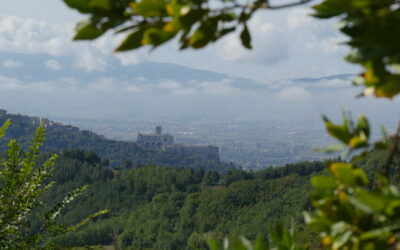Love is the fulfilment of our life, the one secure guiding principle we can follow. The whole of Christian ethics is contained in these words. Human behaviour, if it wishes to be according to what God thought when he created us, and so genuinely human, must be animated by love. If our ‘walk’ (which stands for our life) is to reach its objective, it must be guided by love, the summary of the entire law. The apostle Paul is speaking to the Christians in Ephesus when he makes this exhortation. It is the conclusion and summary of what he has just written to them about the Christian way of life: going from the old self to the new self, being true and sincere with one another, not stealing, knowing that we are forgiven, doing what is good, in a word ‘walking in love’. It would be useful to read the couple of sentences that give us these incisive words which will be with us throughout the month: ‘Therefore be imitators of God, as beloved children. And walk in love, as Christ loved us and gave himself up for us, a fragrant offering and sacrifice to God.’ Paul is convinced that our every move must be modelled on God’s way of behaving. If love is God’s distinguishing feature, it must be also for his children. They must imitate him in this. But how can we know God’s love? For Paul it is extremely clear. God’s love is revealed in Jesus, who shows how and how much God loves. The apostle experienced it at first hand: Christ ‘loved me and gave himself for me’ (Gal. 2:20), and now Paul reveals this to everybody so that it may become the experience of the whole community. ‘Walk in love’ What is the measure of Jesus’s love which should be the model for our love? It, we know, has no limits, no exceptions, no partiality. Jesus died for all, even his enemies, those who were crucifying him, just as the Father in his universal love makes his sun shine and his rain fall upon all, good and bad, sinners and righteous alike. He knew how to care above all for the little ones and the poor, the sick and the excluded. He loved his friends with intensity. He was particularly close to his disciples… His love spared nothing and went to the extreme of his giving his life. And now he calls all to share in his same love, to love as he has loved. This call could scare us, because it demands too much. How can we be imitators of God, who loves everyone, always, taking the initiative? How can we love with the measure of Jesus’s love? How can we live ‘in love’, as this Word of Life asks of us? It is possible only if we ourselves have first had the experience of being loved. In the expression ‘walk in love, as Christ loved us’, the word ‘as’ can also be translated ‘because’. ‘Walk in love’ Walking means acting, behaving, which means to say that everything we do must be inspired and moved by love. But perhaps it is not by chance that Paul uses this dynamic word to remind us that we learn by loving, that there is a whole road to go before reaching the wideness of God’s heart. He uses other images to point out the need for constant progress, such as the growth of infants to adulthood (see 1 Cor. 3:1-2) or races in the stadium to win a prize (see 1 Cor. 9:24). We are always a work in progress. Time and constancy are required to reach our goal, without giving up in the face of difficulties, without ever letting ourselves be discouraged by failures and mistakes, ready always to start again, without giving in to mediocrity. Augustine of Hippo, perhaps thinking of his own painful journey, wrote: ‘You always dislike what you are, if you want to reach what you are not yet. In fact where you feel at ease, you stop, and you say, “That’s enough,” and like that you sink. Build up continuously, walk ahead always, go forward without ceasing; do not pause long on the way, do not look behind, do not leave the track. The one who goes not ahead, stays behind.’ ‘Walk in love’ How can we walk most swiftly upon the way of love? Since the invitation is given to the whole community (the word ‘walk’ is in plural form), it is a good idea to help one another. Indeed, it is sad and tough to go on a journey alone. We could start by finding the opportunity to declare to one another again (with our friends, families, the members of the same Christian community) our will to walk together. We could share our positive experiences about how we have loved, so as to learn from one another. We could share with someone able to understand us the mistakes we have made and our slips along the way, so as to be corrected. Prayer together too can give us light and strength to go ahead. United among us and with Jesus (who called himself the Way!) in our midst we will be able to travel along the whole of our ‘Holy Journey’. We will sow love around us and we will reach the goal: Love. Fabio Ciardi
Take a sense of family everywhere
Take a sense of family everywhere




0 Comments